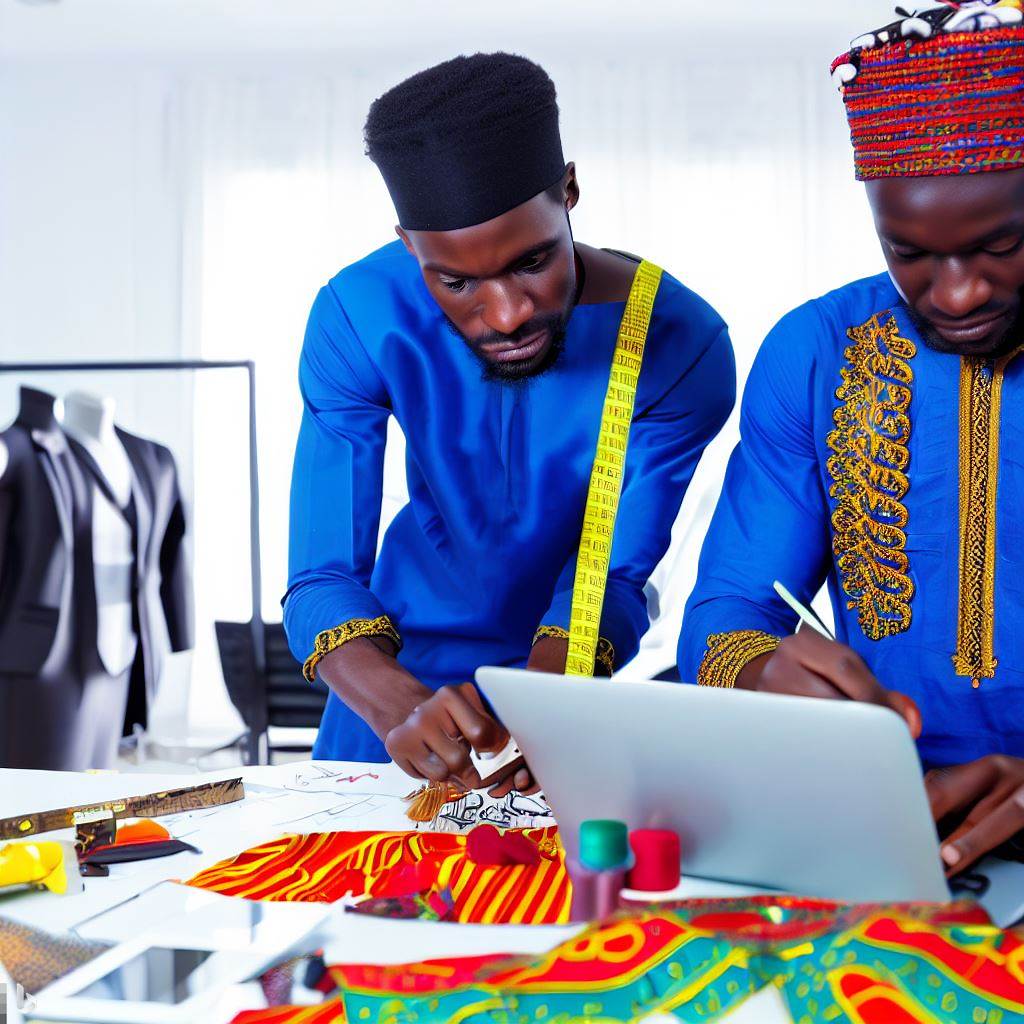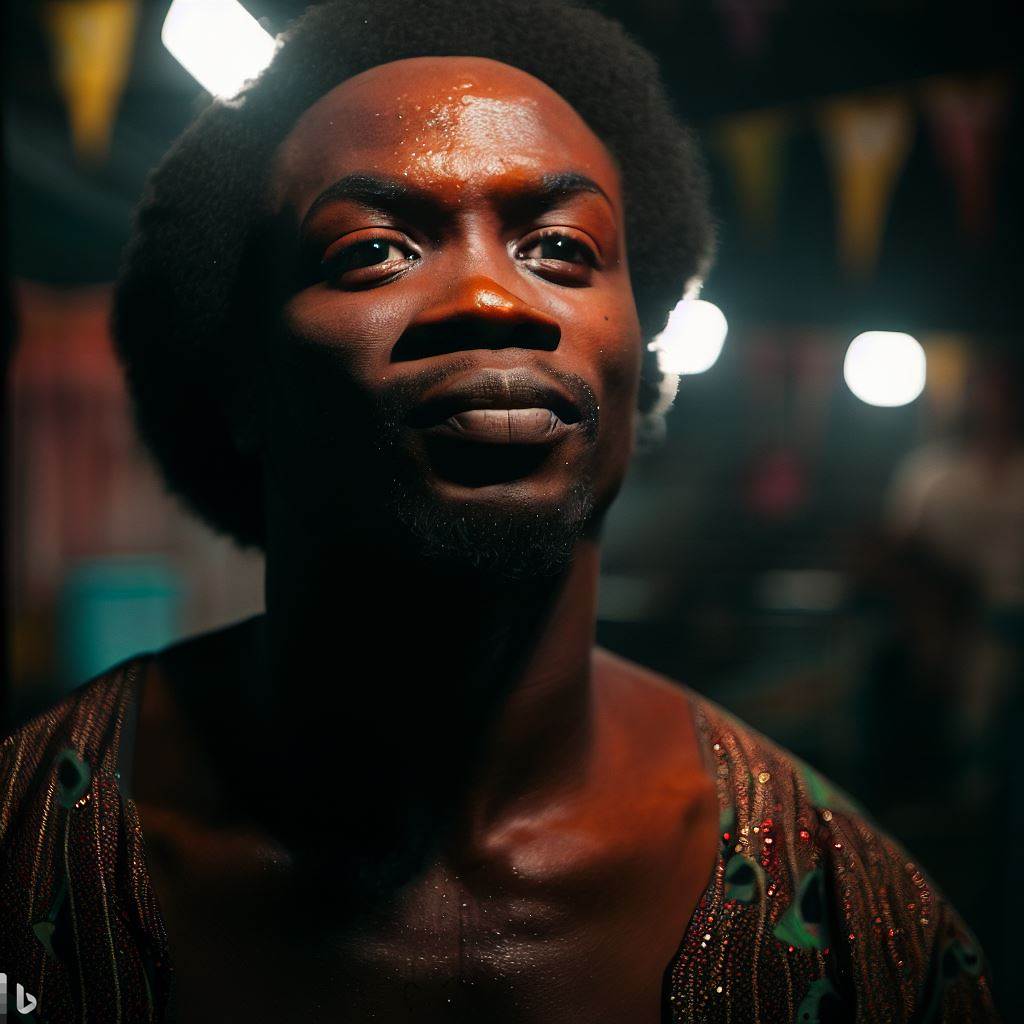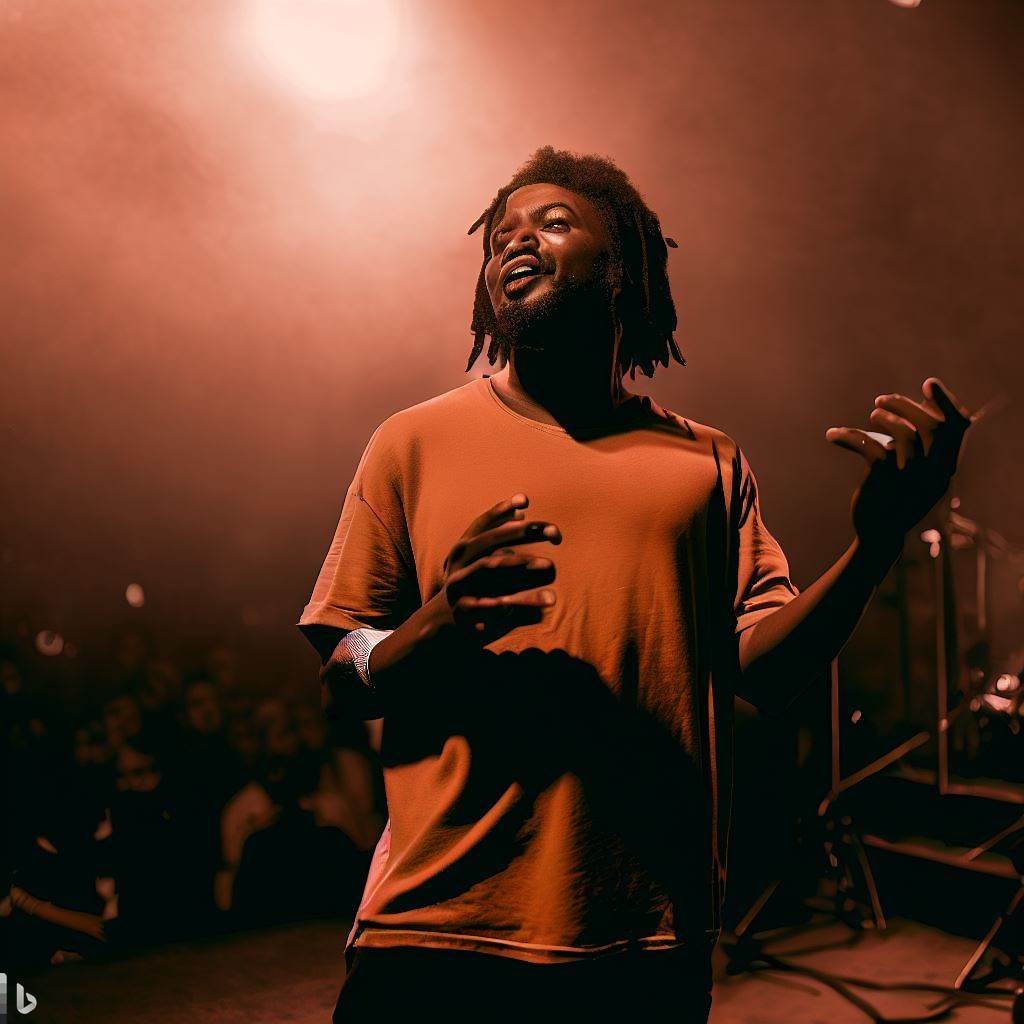Introduction
A. The concept of Nigerian identity
Nigerian identity is a dynamic and multifaceted concept that encompasses cultural, historical, and social elements.
It is a reflection of the country’s rich and diverse traditions, languages, music, dances, and lifestyles.
Costume design plays a significant role in representing and preserving Nigerian culture and heritage.
Costume design serves as a visual manifestation of Nigerian identity.
It allows individuals to showcase their cultural affiliations, beliefs, and traditions.
Through the careful selection of fabrics, colors, patterns, and accessories, costume designers bring the essence of Nigerian culture to life.
Whether it is the vibrant Ankara prints, the intricate embroidery work of the Aso Oke, or the regal elegance of the Agbada, each costume carries a distinct identity.
B. Importance of costume design in representing culture and heritage
The importance of costume design in showcasing Nigerian identity cannot be underestimated.
It serves as a medium through which Nigerians can express their cultural pride and celebrate their heritage.
By wearing traditional attire for ceremonies, festivals, or even in everyday life, they reinforce their connection to their roots and contribute to the preservation of Nigerian culture.
Furthermore, Nigerian costume design also plays a significant role in breaking stereotypes and challenging misconceptions about the country.
It serves as a visual representation of the country’s diversity and richness, showcasing the different ethnic groups and their unique traditions.
Through costume design, Nigerians are able to challenge preconceived notions and present a more accurate and nuanced portrayal of their identity.
C. Thesis statement
In essence, Nigerian costume design serves as a powerful tool in showcasing Nigerian identity.
It allows individuals to visually represent their culture, heritage, and beliefs.
Through the careful selection and design of costumes, Nigerians are able to express their cultural pride, challenge stereotypes, and contribute to the preservation of their diverse traditions.
Nigerian Traditional Attire
A. Overview of traditional Nigerian clothing styles
- Nigerian traditional clothing styles are diverse and reflect the country’s rich cultural heritage.
- They vary from region to region and are influenced by factors such as climate, tradition, and religion.
- Men and women have distinct attire, each reflecting their respective cultural practices and beliefs.
- Common traditional clothing styles for men include agbada, babariga, and fila.
- For women, popular choices include iro and buba, gele, and wrappers.
B. Popular Nigerian fabrics such as Ankara and Aso-oke
- Ankara fabric, also known as African wax print, is a vibrant and colorful fabric widely used in Nigerian fashion.
- It is characterized by bold patterns and designs, often featuring cultural motifs and symbols.
- Aso-oke is another traditional fabric, primarily worn by the Yoruba people in southwestern Nigeria.
- It is handwoven and intricately designed, making it a popular choice for special occasions and celebrations.
- Both fabrics showcase the uniqueness and creativity of Nigerian fashion, attracting global attention and appreciation.
C. Traditional Nigerian accessories and their significance
- Accessories play an essential role in completing the Nigerian traditional attire, enhancing its beauty and cultural significance.
- Gele, a large head wrap, is a prominent accessory worn by women, representing elegance and femininity.
- Coral beads, made from precious materials, are often worn as necklaces, bracelets, or waistbands to symbolize wealth and status.
- Aso-oke caps, typically worn by men, display intricate designs and serve as a symbol of prestige.
- These accessories hold significant cultural value, passing down important symbols and traditions to future generations.
D. Examples of Nigerian traditional attire worn on various occasions
- For weddings, the bride may wear a beautiful lace gown or a heavily embellished Ankara or Aso-oke ensemble.
- Men often opt for traditional agbada or babariga with vibrant embroidery and accessories to match.
- During festivals and cultural events, Nigerians showcase their heritage by donning elaborate traditional outfits.
- Traditional dances and ceremonies feature attire specific to the region or ethnic group, connecting people to their roots.
- Even in modern settings, Nigerians take pride in incorporating traditional elements into their everyday fashion choices.
In general, Nigerian traditional attire embodies the country’s rich cultural identity through diverse clothing styles, vibrant fabrics, and symbolic accessories.
It reflects the traditions, beliefs, and values of the Nigerian people while allowing for individual creativity and expression.
Whether worn on special occasions or integrated into daily life, traditional attire is a celebration of heritage and a source of national pride.
Read: The Joy and Perseverance of Nigerian Circus Performers
Contemporary Nigerian Costume Design
A. Exploring the Influence of Western Fashion on Nigerian Attire
Nigerian fashion has undeniably been shaped by Western trends. Jeans, for instance, have become ubiquitous in Nigerian wardrobes.
T-shirts, adorned with catchy slogans or images, are also highly popular.
Furthermore, Western-style suits are donned for formal occasions and corporate settings.
Women often opt for elegant Western gowns or blouses paired with skirts. This influence demonstrates a harmonious blend of cultures within Nigeria.
B. Fusion of Traditional and Contemporary Elements in Nigerian Fashion
The heart of contemporary Nigerian fashion lies in its fusion of tradition and modernity.
Designers meticulously infuse traditional fabrics like Ankara into Western-style silhouettes, creating stunning, culturally rich ensembles.
Notably, the gele, a traditional Nigerian headwrap, has evolved into a statement piece, often complementing both traditional and contemporary outfits.
The blend of tradition with contemporary aesthetics is a testament to Nigeria’s rich heritage.
C. Analysis of Nigerian Celebrity Fashion Designers and Their Impact on the Global Fashion Industry
Nigerian celebrity fashion designers have catapulted Nigerian fashion onto the global stage.
Notable designers like Deola Sagoe, Lisa Folawiyo, and Mai Atafo have gained international recognition.
Their creations grace runways in Paris, New York, and Milan, captivating fashion enthusiasts worldwide.
These designers are not merely trendsetters; they are cultural ambassadors, showcasing Nigeria’s creativity and innovation.
D. Ways in Which Contemporary Nigerian Costume Design Reflects Nigerian Identity
- Diverse Cultural Expressions: Nigerian attire reflects the country’s vast cultural diversity. From the Yoruba’s flowing agbada to the Igbo’s colorful wrappers, each piece tells a unique story.
- Bold and Vibrant Colors: Nigerian fashion is known for its vibrant color palette. Bright hues symbolize the vivacious spirit of Nigerians, with each color carrying cultural significance.
- Emphasis on Family and Tradition: Nigerian clothing often emphasizes family ties and tradition. Outfits for special occasions, like weddings, showcase intricate embroidery and motifs that convey deep-rooted values.
- Resilience and Adaptability: Nigerian fashion adapts to changing times while preserving tradition. This resilience reflects Nigeria’s ability to embrace modernity while cherishing its heritage.
All in all, contemporary Nigerian costume design is a captivating reflection of the nation’s identity.
It embodies a harmonious blend of Western influence, traditional roots, and the creativity of its celebrity designers.
Through fashion, Nigeria proudly showcases its diversity, resilience, and rich cultural heritage to the world.
Read: Unveiling the Hidden Challenges of Circus Life in Nigeria

Find Out More: How to Break into Nigeria’s Music Industry
Role of Costume Design in Nigerian Film Industry
A. Introduction to Nollywood and its Significance in Nigerian Culture
Nollywood, Nigeria’s movie industry, is a global phenomenon, celebrating the nation’s rich culture, values, and traditions.
It’s the second-largest film industry globally, captivating audiences with its unique storytelling.
- Cultural Beacon: Nollywood reflects Nigeria’s diverse ethnicities, languages, and lifestyles.
- Socioeconomic Impact: It’s a vital source of employment and a significant contributor to Nigeria’s GDP.
B. Importance of Costume Design in Nollywood Films
Costume design in Nollywood is more than just dressing characters; it’s a storytelling tool with cultural depth.
- Cultural Accuracy: Costumes bring historical and contemporary Nigerian settings to life.
- Character Depiction: They define characters, revealing their status, personality, and narrative role.
C. Examples of Nigerian Films Showcasing Identity through Costume Design
- “The Wedding Party”: Extravagant traditional wedding attire reflects Yoruba culture.
- “King of Boys”: Powerful characters don striking, regal clothing, symbolizing authority.
- “October 1”: Period costumes transport viewers to Nigeria’s pre-independence era.
D. Impact of Costume Design on Storytelling and Character Development in Nigerian Movies
- Enhanced Authenticity: Authentic costumes make narratives relatable and immersive.
- Cultural Preservation: They preserve and promote Nigeria’s cultural heritage.
- Character Evolution: Costume changes signal character growth or transformation.
To summarize, costume design is a potent tool in Nollywood, portraying Nigerian identity and enriching storytelling.
As Nollywood continues to captivate global audiences, its costume designers play an invaluable role in showcasing Nigeria’s vibrant culture and heritage.
Read: How to Enter Nigeria’s Circus Performance Industry
Costume Design as a Symbol of Nigerian Pride
A. Examination of the role of costume design in national celebrations and festivals
- Costume design plays a significant role in showcasing the Nigerian identity during national celebrations and festivals. It serves as a symbol of national pride and cultural heritage.
- The designs, colors, and fabrics used in Nigerian costumes are carefully chosen to represent different ethnic groups and regions of the country. They embody the rich diversity and unity of the Nigerian people.
- Costumes are meticulously crafted to reflect traditional craftsmanship and artistry. They are often adorned with intricate embroidery, beadwork, and motifs that hold deep cultural and historical significance.
- During national celebrations like Independence Day and cultural festivals such as the Durbar festival, Nigerians proudly don their traditional attire. This not only unifies the nation but also showcases the unique beauty and diversity of Nigerian costumes.
B. Examples of Nigerian national events where traditional attire is worn
- One prominent example is the Independence Day celebration held every October 1st. Nigerians across the country showcase their national pride by dressing in traditional costumes.
- Another significant event is the annual Calabar Carnival, which attracts participants from different Nigerian ethnic groups. People dress in vibrant traditional outfits, celebrating their cultural heritage while promoting unity.
- Furthermore, during traditional weddings, Nigerians enthusiastically embrace their cultural roots through costume design. Each ethnic group showcases its unique attire, reinforcing the importance of traditions in Nigerian society.
C. How costume design helps Nigerians in the diaspora connect with their cultural roots
- For Nigerians living in the diaspora, costume design serves as a powerful tool for connecting with their cultural roots and preserving their heritage.
- Many Nigerians in foreign countries organize cultural events where they showcase traditional costumes. This helps create a sense of belonging and community, fostering pride in their Nigerian identity.
- Wearing Nigerian costumes allows them to share their culture with others and educate people about the country’s traditions and customs. It becomes a way of preserving their cultural heritage and passing it on to future generations.
D. Influence of Nigerian costume design on promoting tourism and cultural exchanges
- Nigerian costume design plays a crucial role in promoting tourism and cultural exchanges. It attracts visitors from around the world who are curious to experience Nigerian culture firsthand.
- The vibrant and diverse costumes captivate tourists and showcase the creativity and artistic talent of Nigerian designers and artisans. This, in turn, supports the local economy and boosts tourism revenue.
- Moreover, Nigerian costume design has gained international recognition, with fashion shows and exhibitions being held globally. This provides opportunities for cultural exchanges and fosters a better understanding and appreciation of Nigerian traditions.
In short, costume design serves as a powerful symbol of Nigerian pride and identity.
It plays a significant role in national celebrations, helps Nigerians in the diaspora connect with their cultural roots, and promotes tourism and cultural exchanges.
The rich diversity and beauty of Nigerian costume design showcase the country’s vibrant heritage and contribute to Nigeria’s global presence.
Read: Role of Women in Nigeria’s Circus Performance Scene
Conclusion
A. Recap of the significance of Nigerian costume design in showcasing Nigerian identity.
Throughout history, Nigerian costume design has played a vital role in representing and celebrating Nigerian identity.
These traditional garments reflect the diverse and rich cultural heritage of the country, allowing Nigerians to express their unique cultural identity through clothing.
B. Ensuring the preservation and promotion of Nigerian costume design.
It is crucial to recognize and support Nigerian costume designers to ensure the preservation and promotion of their craft.
By valuing and uplifting these designers, we can help preserve Nigerian cultural heritage and ensure its longevity for future generations.
C. Final thoughts on the rich heritage and diverse cultural identity reflected through Nigerian costume design.
Nigerian costume design goes beyond mere clothing – it carries the stories, traditions, and values of the Nigerian people.
It showcases the resilience, creativity, and unity of Nigerians, ultimately serving as a platform for cultural expression and celebration.
Nigerian costume design is a powerful medium for showcasing Nigerian identity.
As we embrace and celebrate this unique form of artistry, we honor the country’s rich heritage and foster a sense of pride and appreciation for Nigerian culture.




